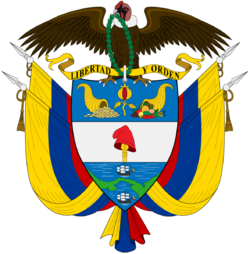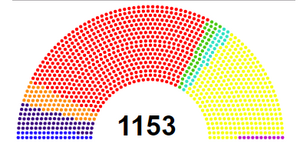Senate of the Republic (Mauridiviah)
Senate of the Republic Senado de la República | |
|---|---|
| 15th Senate | |
 | |
| Type | |
| Type | |
| Houses | Senado de la República |
| Leadership | |
Speaker pro tempore | |
| Structure | |
| Seats | 1153 |
 | |
Senate political groups | Government
Supported by
Opposition
|
| Senate committees | Ministry of Foreign Affairs,
Ministry of Finance, Post Office Ministry, Ministry of Justice, Ministry of Internal Affairs, Ministry of Agriculture, Ministry of Trade, Ministry of National Labor, Ministry of Homeland Defense, Ministry of Sanitation, Ministry of Human Services, Ministry of Urban Development, Ministry of Transport, Ministry of Energy Sufficiency, Ministry of Education, Ministry of Service Compensation, Counterterrorism Ministry, Ministry of Enviromental Conservation, Ministry of Tourism, Ministry of Cultural Advancement, Ministry of Foreign Aid, Ministry of Native Alharun Relations, Ministry of Youth Relations, Ministry of Sport Facilitation, Ministry of Secret Affairs. |
Length of term | 5 year maxium; No minimum |
| Elections | |
Senate voting system | Single Transferable Vote |
Senate last election | June 3rd 2018 |
Senate next election | 2020 |
| Redistricting | 2020 |
| Motto | |
| Libertad y Orden | |
| Meeting place | |
| Capitol Building | |
| Website | |
| www | |
| Constitution | |
| Constitution of the Republic (Adopted 1988) | |
The Senate of the Republic, commonly known as the Senate, is the supreme legislative body of Mauridiviah. It alone possesses legislative supremacy and thereby ultimate power over all other political bodies in Mauridiviah. Its head is the President of the Republic (Currently Diego Polo) and its seat is the Legislative Palace in Maurotopia. The Senate is unicameral, and is elected at least every 5 years. By constitutional mandate, an election is held in every year divisible by five to combat the abuse of snap elections by political actors.
The President is not necessarily elected alongside the Senate, as a presidential election only happens every five years.
Composition and Powers
Beyond passing legislation, the Senate has a number of powers, including approving the budget, initiating impeachment proceedings against most government officials (including ministers, the Vice President, and the President), appointing the members of the judicial branch of government, and confirming Cabinet appointments that come from outside the Senate. Among others it also has the power to authorize foreign and domestic military action and to suspend federalist priviledge for states.
The Senate is led by a President with his Vice President and a Speaker pro tempore. The President also heads the executive branch of government.
Since 2015 the Senates's 25 Committees (Ministries), created by the 2015 Senate Rules, are manned with a minimum number of 1 senator(s) tackling legislation of various issues. The Committees' offices are housed in the Legislative Palace.